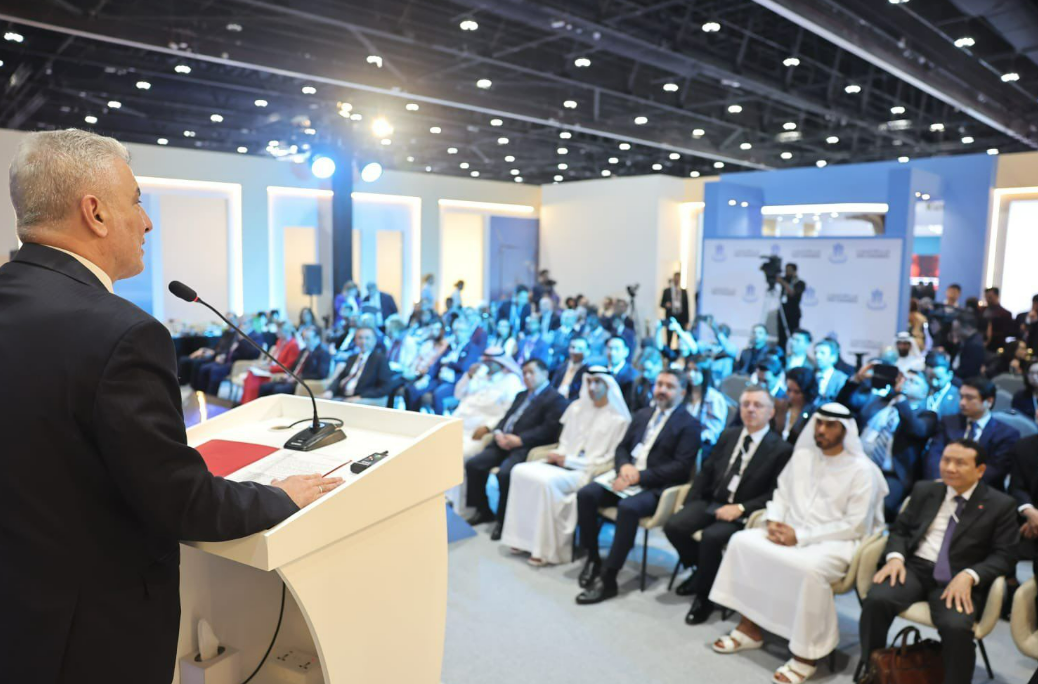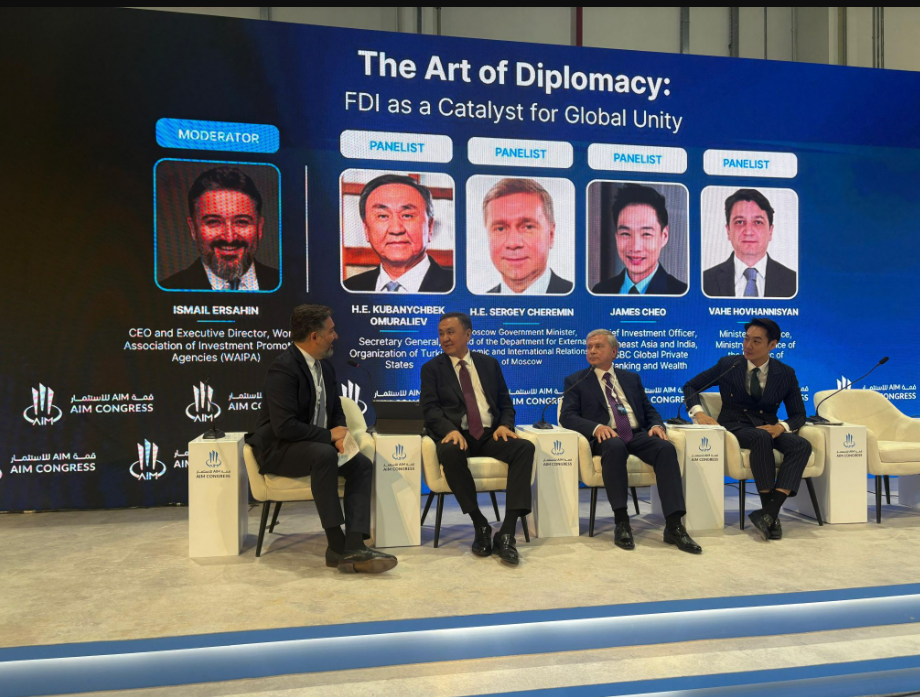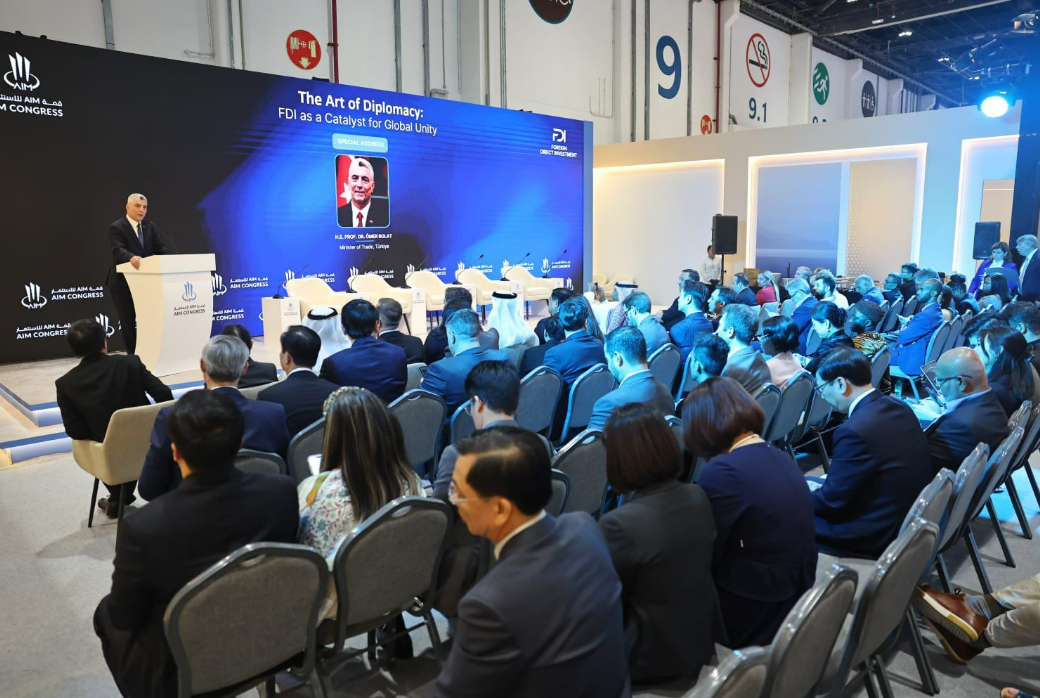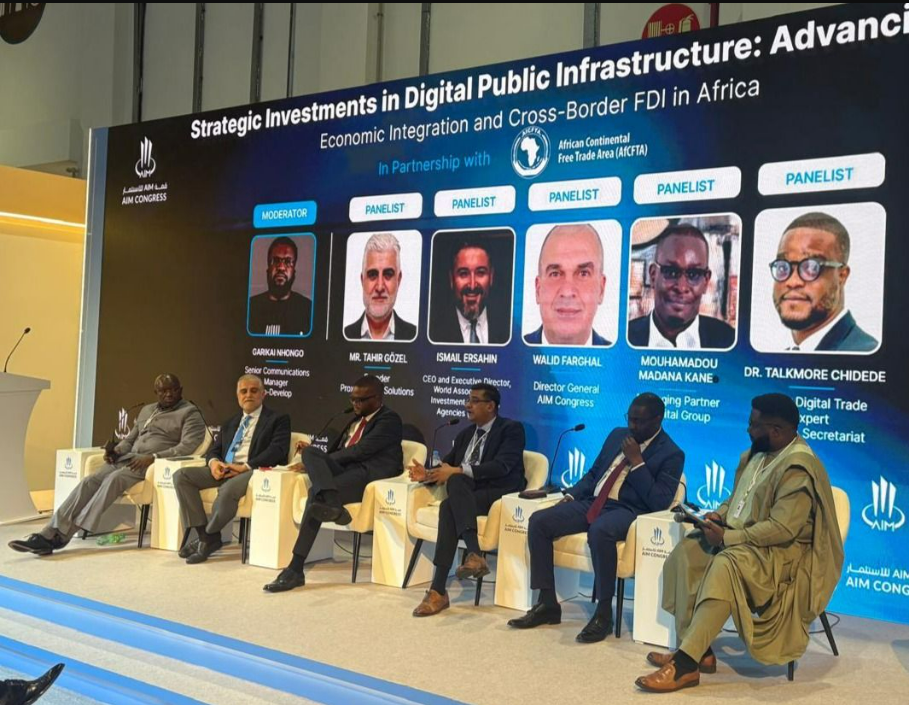WAIPA’s actively participated at the AIM Congress 2025, which took place on 7-9 April in Abu Dhabi, UAE.
Under this year’s AIM theme, “Adapting to a Shifting Investment Landscape: Harnessing New Potential for Global Economic Development,” WAIPA brought the voice of IPAs to the forefront, contributing to over 8 strategic sessions and leading critical dialogues shaping the future of FDI.
High-level session “The Art of Diplomacy: FDI as a Catalyst for Global Unity”
At the forefront of global investment dialogue, Mr. Ismail Ersahin, ED & CEO of WAIPA, moderated the high-level session titled “The Art of Diplomacy: FDI as a Catalyst for Global Unity.”
This timely session began with powerful keynote addresses from two distinguished leaders:
H.E. Nguyen Chi Dung, Deputy Prime Minister, Socialist Republic of Vietnam, who emphasized that in the face of rising global uncertainty, now is the time for countries to strengthen cooperation and pursue inclusive, sustainable development. New economic trends—from the digital and green economy to AI and semiconductors—are opening new growth frontiers where proactive, reform-driven nations will lead the way.”
H.E. Prof. Dr. Ömer Bolat, Minister of Trade, Republic of Türkiye, who noted that despite global economic challenges—such as supply chain disruptions, geopolitical risks, and logistical barriers—investment opportunities grounded in fair competition and mutual benefit continue to emerge. In this context, regional and global cooperation is more important than ever. We must act decisively to strengthen collaboration and partnerships that foster sustainable economic development.
Their visionary remarks set the stage for an insightful discussion featuring esteemed leaders who operate at the intersection of diplomacy and investment:
H.E. Omuraliev Kubanychbek – Secretary General, Organization of Turkish States
H.E. Sergey Cheremin – Minister, Moscow Government; Head of External Economic and International Relations
James Cheo, CFA, CAIA, FRM – Chief Investment Officer, Southeast Asia and India, HSBC Global Private Banking and Wealth
The discussion revolved around three critical themes:
- FDI as a Builder of Trust & Long-Term Alliances How FDI initiatives have supported Libya’s post-conflict reconstruction, fostered regional cohesion through the Organization of Turkish States, and enabled city-level diplomacy in Moscow.
- FDI in Conflict Recovery & Multilateral Cooperation Real-world examples showcased FDI’s strategic role in rebuilding economies, easing geopolitical tensions, and encouraging cooperation between nations.
- The Soft Power of FDI Panelists emphasized the cultural dimension of investment—how trust, affinity, and deep geopolitical insight enhance investment outcomes and promote unity.
As Mr. Ersahin emphasized in his remarks:
“In a world of growing interdependence, FDI is no longer just an economic vehicle—it’s a diplomatic bridge. When used wisely, is a powerful force; not only for growth, but for unity.”
As global dynamics evolve, sessions like this spotlight the transformative potential of FDI—not just for economic advancement, but as a tool for peace, connection, and shared prosperity.
African Continental Free Trade Area (AfCFTA) Secretariat’s high-level session: “Strategic Investments in Digital Public Infrastructure: Advancing Regional Economic Integration and Cross-Border FDI in Africa.”
WAIPA Deputy Executive Director, Mr. Dushyant Thakor joined esteemed stakeholders to explore how Digital Public Infrastructure (DPI)—including broadband networks, data centers, and fintech, can drive Africa’s digital transformation, boost intra-African trade, and attract cross-border FDI under the AfCFTA framework.
This important dialogue aligns closely with this year’s AIM theme: “Adapting to a Shifting Investment Landscape: Harnessing New Potential for Global Economic Development.”
The session focused on:
– The role of DPI in enabling digital trade and integration across the continent
– Regulatory frameworks supporting seamless cross-border digital transactions
– The importance of public-private partnerships in mobilizing investment for Africa’s digital economy
With internet still at approximately 43%, urgent investment is needed to unlock Africa’s full participation in the global digital economy. The AfCFTA Protocols on Digital Trade and Investment offer a blueprint for building a single digital market, fostering regulatory predictability, and accelerating sustainable economic growth.
Panel Discussion: Building Regional Investment Strategies: A Step-by-Step Approach for Investor
WAIPA’s Chief Expert Mr. José Henrique Vieira Martins joined fellow experts to explore a practical road-map for investors looking to make informed, strategic decisions across regions:
🔹Latifa El Bouabdellaoui, Director-General, Islamic Center for Development of Trade (ICDT)
🔹Heather L. Taylor-Strauss, PhD, Head of FDI Programmes, United Nations ESCAP,
🔹Rene Wessels ( Van Zyl), Senior Executive, Investec
🔹Andreas Dressler, Managind Director, FDI Center
Mr. Martins emphasized the growing importance of regional investment promotion:
“Promoting countries collectively as a region—through groups or associations of IPAs, maximizes global appeal and competitiveness. Investors are increasingly seeking access to broader markets, cost efficiencies, and diverse opportunities that go beyond national borders. This approach also helps smaller economies stand out and attract investment they may not achieve alone.”
To support this approach, WAIPA recently launched the Subcommittee for Regional IPA Associations (SCRIPA)—a strategic initiative designed to help Investment Promotion Agencies collaborate, co-promote, and build stronger regional ecosystems.
Mr. Martins outlined five key principles for effective regional investment collaboration:
1️⃣ A clear and shared purpose
2️⃣ Strong collaboration and networking
3️⃣ A centralized platform for information sharing
4️⃣ Joint marketing and events
5️⃣ Capacity building and mutual support among members
This session delivered practical, step-by-step guidance for institutional investors, development agencies, and multinationals looking to align strategies with regional dynamics, assess risk, engage stakeholders, and navigate local frameworks.






